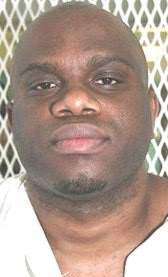Franklin Alix was a serial killer who was executed by the State of Texas for the murder of Eric Bridgeford
According to court documents Franklin Alix would abduct a woman, sexually assault her and then drove her back to her home which he planned to rob. Eric Bridgeford, the woman’s brother, would see Alix and try to flee however would be shot and killed
Franklin Alix was arrested, convicted and sentence to death
During the punishment part it was revealed that Alix had committed three other murders, two attempted murders, eight aggravated robberies, one robbery and two aggravated sexual assaults accompanied by four aggravated kidnappings.
Franklin Alix would be executed by lethal injection on March 30 2010
Franklin Alix Photos

Franklin Alix FAQ
When Was Franklin Alix Executed
Franklin Alix was executed on March 30 2010
Franklin Alix Case
As members of his victim’s family quietly wept, Houston killer Franklin DeWayne Alix Tuesday went to his execution apologizing for his crime, but insisting that he was “not the monster they painted me.”
Alix, 34, once described by prosecutors as “a poster boy for the death penalty,” was put to death for the January 1998 murder of Eric Bridgeford. Joining Bridgeford’s relatives in the witness room were the father and sister of Christopher Thomas, who prosecutors said Alix also killed.
Minutes before the lethal drugs began to flow, Alix, strapped to the gurney in the state’s death chamber, admitted he had “made lots of mistakes” leading to the Bridgeford murder. But, he denied being an alcoholic, a drug user or a rapist.
“I messed up,” he said, “made poor choices.”
Looking toward a witness room occupied by his friends and relatives, Alix said, “I got peace in my heart.”
Alix was declared dead at 6:20 p.m. — seven minutes after the deadly drugs were administered.
Speaking to reporters after the execution, relatives of both victims said they had forgiven the killer.
“If you don’t forgive, it will consume you,” said Fernellifa Jolivette, Thomas’ sister. “It will eat you alive … He has God to answer to.”
Bridgeford’s mother, Janey Bridgeford, carried a photograph of her son into the witness room.
“Every photo has been of Alix,” she said. “I wanted to put a face to this … We live one day at a time. I can’t tell you what my daughter and family have gone through. It was two years before I could go back to work.”
Alix was the fifth killer executed in Texas this year and the first from Harris County.
He killed Bridgeford on Jan. 3, 1998, during a burglary at the Bridgeford residence.
Early that morning, court records indicate, Alix accosted Bridgeford’s sister at gunpoint in the parking lot of the family home, forced her into a car trunk, drove her to an ATM where he unsuccessfully tried to use her bank cards, sexually assaulted her, then returned to her home to steal electronics.
6-month crime spree
The burglary was interrupted by the arrival of Bridgeford and a friend. Official documents said Bridgeford bled to death after Alix shot him in the chest. Alix later led police to a .380-caliber pistol hidden nearby.
In a recent death row interview, Alix admitted firing a shot, but said he had not intended to kill Bridgeford.
During the punishment phase of his trial, prosecutors told jurors Bridgeford’s death was part of a six-month crime spree in which he also committed three capital murders, two attempted capital murders, eight aggravated robberies, one robbery and two aggravated sexual assaults accompanied by four aggravated kidnappings. Christopher Thomas, they said, was among the murder victims.
Alix’s attorneys challenged DNA testing in one of the three extraneous murders, arguing that it had been performed by the Houston Police Department’s scandal-rocked crime lab.
Subsequent testing of evidence in the case yielded ambiguous results, the Texas Court of Criminal Appeals reported, and the trial judge held that a crime lab chemist’s testimony was unreliable.
Still, appeals court judges found no reasonable probability that the jury would have changed its decision based on the question of the chemist’s credibility. Further, the court found “without a reasonable doubt” that the chemist’s testimony did not contribute to punishment.
In the death row interview, Alix denied he committed all the crimes alleged during his trial’s punishment phase. He said the sexual assaults, including that of Bridgeford’s sister, were committed by a man for whom he sold drugs.
In his youth, trial testimony revealed, Alix had been active in his church, singing in the choir and teaching Sunday school.
One witness described him as having been a “typical fun-loving teenager









